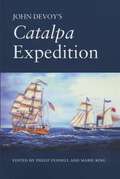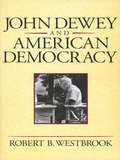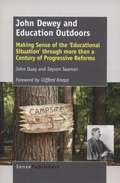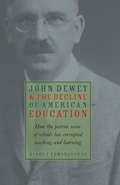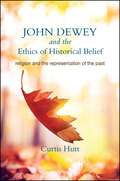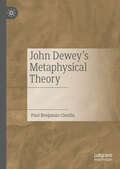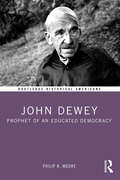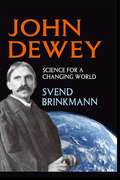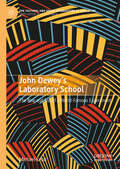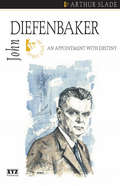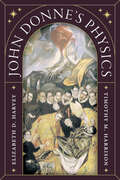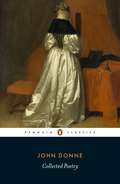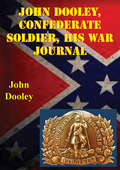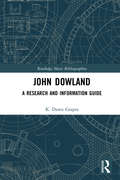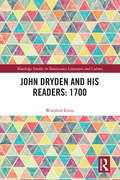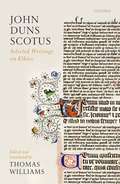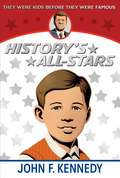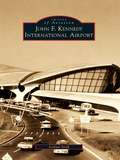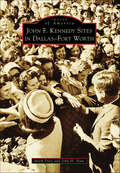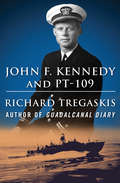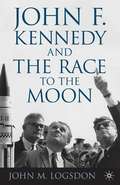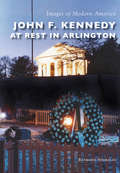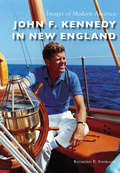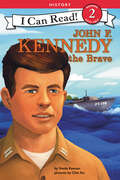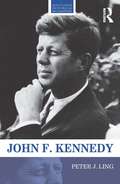- Table View
- List View
John Devoy's Catalpa Expedition
by Philip Fennell Marie KingThe story of John Devoy’s 1876 Catalpa rescue is a tale of heroism, creativity, and the triumph of independent spirit in pursuit of freedom. The daily log on board the whaling ship Catalpa begins with the typical recount of a crew intact and a spirit unfettered, but such quiet words deceive the truth of the audacious enterprise that came to be known as one of the most important rescues in Irish American history. John Devoy’s men rescued six Irish political prisoners from the Australian coast, allowing millions of fellow Irishmen and American-Fenians, many of whom secretly financed the dangerous plot, to draw courage from the newly exiled prisoners.Philip Fennell and Marie King tell the story from John Devoy’s own records and the ship's logbooks. John Devoy's Catalpa Expedition includes an introduction by Terry Golway and the personal diaries, letters, and reports from John Devoy and his men.
John Dewey and American Democracy
by Robert B. WestbrookOver a career spanning American history from the 1880s to the 1950s, John Dewey sought not only to forge a persuasive argument for his conviction that "democracy is freedom" but also to realize his democratic ideals through political activism. Widely considered modern America's most important philosopher, Dewey made his views known both through his writings and through such controversial episodes as his leadership of educational reform at the turn of the century; his support of American intervention in World War I and his leading role in the Outlawry of War movement after the war; and his participation in both radical and anti-communist politics in the 1930s and 40s. Robert B. Westbrook reconstructs the evolution of Dewey's thought and practice in this masterful intellectual biography, combining readings of his major works with an engaging account of key chapters in his activism. Westbrook pays particular attention to the impact upon Dewey of conversations and debates with contemporaries from William James and Reinhold Niebuhr to Jane Addams and Leon Trotsky. Countering prevailing interpretations of Dewey's contribution to the ideology of American liberalism, he discovers a more unorthodox Dewey--a deviant within the liberal community who was steadily radicalized by his profound faith in participatory democracy. Anyone concerned with the nature of democracy and the future of liberalism in America--including educators, moral and social philosophers, social scientists, political theorists, and intellectual and cultural historians--will find John Dewey and American Democracy indispensable reading.
John Dewey and Education Outdoors: Making Sense of the 'Educational Situation' through more than a Century of Progressive Reforms
by John Quay Jayson SeamanThe authors provide detailed explanations of Dewey's thoughts on education while exploring the historical intersections with outdoor education, camping, and environmental education. While situated within a historical perspective, this book provides insights relevant for today's discussions on new educational reform possibilities, learning focused on the whole child that includes out-of-school time experiences such as camp, and the development of 21st century skills needed to navigate our global society.
John Dewey and the Decline of American Education: How The Patron Saint Of Schools Has Corrupted Teaching And Learning
by Henry Edmondson IIIThe influence of John Dewey&’s undeniably pervasive ideas on the course of American education during the last half-century has been celebrated in some quarters and decried in others. But Dewey&’s writings themselves have not often been analyzed in a sustained way. In John Dewey and the Decline of American Education, Hank Edmondson takes up that task. He begins with an account of the startling authority with which Dewey&’s fundamental principles have been—and continue to be—received within the U.S. educational establishment. Edmondson then shows how revolutionary these principles are in light of the classical and Christian traditions. Finally, he persuasively demonstrates that Dewey has had an insidious effect on American democracy through the baneful impact his core ideas have had in our nation&’s classrooms.Few people are pleased with the performance of our public schools. Eschewing polemic in favor of understanding, Edmondson&’s study of the &“patron saint&” of those schools sheds much-needed light on both the ideas that bear much responsibility for their decline and the alternative principles that could spur their recovery.
John Dewey and the Ethics of Historical Belief: Religion and the Representation of the Past
by Curtis HuttJohn Dewey and the Ethics of Historical Belief addresses the ethics of the representation of the past with a focus on the justification of historical belief within religious and critical historiographical traditions. What makes a belief about the past justified? What makes one historical belief preferable to another? A great deal rides on how these questions are answered. History textbook wars take place across the globe, from California to India. Cultural heritage protection is politicized and historical research is commonly deployed in support of partisan agendas.This book explores not only John Dewey's relatively unknown contribution to this topic, but also the leading alternatives to his approach. Author Curtis Hutt focuses attention on the debate among those most influenced by Dewey's thought, including Richard Rorty, Richard Bernstein, James Kloppenberg, Wayne Proudfoot, and Jeffrey Stout. He also reviews the seminal work of Van Harvey on the relationship between historians and religious believers. Dewey is cast as a vigorous opponent of those who argue that justified historical belief depends upon one's religious tradition. Strongly resisted is the idea that historical belief can be justified simply on account of acculturation. Instead, Dewey's view that beliefs are justified as a result of theorized historical inquiry is emphasized. In order to prevent moral blindness, the responsible historian and theologian alike are advised to attend to witnesses to the past that arise from outside of their own traditions.
John Dewey's Metaphysical Theory
by Paul Benjamin CherlinJohn Dewey’s Metaphysical Theory provides an overview and technical exposition of Dewey’s mature ontological theory. In particular, “nature,” “experience,” and their relationship, are given extended treatment through a close reading of primary texts. Following Dewey’s metaphysical postulates and conclusions, the book suggests how experience may reveal the fundamental traits of nature. In addition, the book reveals how Dewey understood the ways in which all phenomena may relate within an inclusive economy of existence, what it means to have an “identity,” what constitutes “selfhood” or personality, and how metaphysics relates to the ideals of democracy and social ethics.
John Dewey: Prophet of an Educated Democracy (Routledge Historical Americans)
by Philip B. MooreThis concise biography tells the story of John Dewey, a pioneer of pragmatism and the first original school of philosophy created in America. The school was born out of a specific historical context, in the wake of a country at war with itself, and in response to the rapid changes of industrialization. Dewey’s pragmatism celebrated human intelligence and agency and the promise that tomorrow could be better than today. For Dewey, pragmatism was the philosophy of democracy.Dewey lived from just before the Civil War to just before school integration. As such, the book touches on many key moments in American history, from social reform in turn of the century Chicago, to censorship during World War One, and to the government’s responsibilities in the Great Depression. It covers all this in the context of the life of a man whose ideas helped shape American culture and intellectual life.John Dewey: Prophet of an Educated Democracy will appeal to students, scholars, and all those interested in American philosophy and history of the 19th and 20th centuries. It will also complement humanities courses on American philosophy, history, and intellectual traditions.
John Dewey: Science for a Changing World (History And Theory Of Psychology Ser.)
by Svend BrinkmannJohn Dewey was an American psychologist, philosopher, educator, social critic, and political activist. John Dewey: Science for a Changing World addresses Dewey's contemporary relevance; his life and intellectual trajectory; his basic philosophical ideas, with an emphasis on his philosophy of nature; and his educational theory, which has often been misunderstood. In addition, Dewey's pragmatism and pragmatist ethics are discussed, as are some of the criticisms that can be directed at them. Throughout the book, Dewey's ideas are related to the general history of ideas, but there is also a constant focus on how Dewey may assist us in solving some of the problems that face us in a so-called postmodern era. This book is the first to offer an interpretation of John Dewey's works with particular emphasis on his contribution to psychology. John Dewey distinguished himself by combining a culturalist approach to human life with a naturalistic one. He was an avowed naturalist and follower of Darwin, and Brinkmann shows how his non-reductionist, naturalist psychology can serve as a much-needed correction to contemporary forms of "evolutionary psychology." Dewey's psychology, however, is not an isolated element in his thinking as a whole, so the author also provides an introduction to the philosophical, ethical, and educational ideas that go hand-in-hand with his psychology. In the past couple of decades, there has been a renaissance of pragmatist ideas in philosophy, political theory, and education. Scholars are returning to the writings of William James, Charles Peirce, George Herbert Mead, and John Dewey. This book continues the fine tradition of Transaction's History and Theory of Psychology series.
John Dewey’s Laboratory School: The Rise and Fall of a World-Famous Experiment (The Cultural and Social Foundations of Education)
by Michael KnollThe Laboratory School is presumably the most famous experimental school of the progressive education movement. Founded in 1894 by John Dewey and President William R. Harper, the Laboratory School existed at the University of Chicago for seven and a half years, and even after more than a century, remains a beacon of hope and inspiration for many educators. The present volume ventures to provide the first institutional history of the Laboratory School and to situate the school in its contemporary context. Drawing on new archival and historical materials, the book tells the story of a legendary school experiment that experienced a steep rise and a dramatic fall due to unsuitable structures and unfortunate decisions.
John Diefenbaker
by Arthur SladeAt the age of nine, John Diefenbaker announced, "I’m going to be prime minister when I grow up." He never lost sight of his goal. Diefenbaker was prime minister of Canada from 1957-1963. He believed in social justice, opening up the North, and making things better for western farmers. Canadians responded to his campaign call to "Follow John." This compelling book recreates the tensions of the Diefenbaker era - the time of the Cold War, spy scandals, and the Cuban Missile Crisis - when the world seemed on the brink of nuclear war.
John Donne's Physics
by Elizabeth D. Harvey Timothy M. HarrisonA reimagining of Devotions upon Emergent Occasions as an original treatment of human life shaped by innovations in seventeenth-century science and medicine. In 1624, poet and preacher John Donne published Devotions upon Emergent Occasions, a book that recorded his near-death experience during a deadly epidemic in London. Four hundred years later, in the aftermath of our own pandemic, Harvey and Harrison show how Devotions crystalizes the power, beauty, and enduring strangeness of Donne’s thinking. Arguing that Donne saw human life in light of emergent ideas in the study of nature (physics) and the study of the body (physick), John Donne’s Physics reveals Devotions as a culminating achievement, a radically new literary form that uses poetic techniques to depict Donne’s encounter with death in a world transformed by new discoveries and knowledge systems.
John Donne: Collected Poetry
by John DonneRegarded by many as the greatest of the Metaphysical poets, John Donne (1572-1631) was also among the most intriguing figures of the Elizabethan age. A sensualist who composed erotic and playful love poetry in his youth, he was raised a Catholic but later became one of the most admired Protestant preachers of his time. The Collected Poetry reflects this wide diversity, and includes his youthful songs and sonnets, epigrams, elegies, letters, satires, and the profoundly moving Divine Poems composed towards the end of his life. From joyful poems such as 'The Flea', which transforms the image of a louse into something marvellous, to the intimate and intense Holy Sonnets, Donne breathed new vigour into poetry by drawing lucid and often startling metaphors from the world in which he lived. His poems remain among the most passionate, profound and spiritual in the English language.
John Dooley, Confederate Soldier His War Journal
by Douglas Southall Freeman John Dooley Joseph T. Durkin"One of the best primary accounts of the Civil War by a Confederate.John Dooley was the youngest son of Irish immigrants to Richmond, Virginia, where his father prospered, and the family took a leading position among Richmond's sizeable Irish community. Early in 1862, John left his studies at Georgetown University to serve in the First Virginia Infantry Regiment, in which his father John and brother James also served. John's service took him to Second Manassas, South Mountain, Sharpsburg (Antietam), Fredericksburg, and Gettysburg; before that last battle, Dooley was elected a lieutenant. On the third day at Gettysburg, Dooley swept up the hill in Pickett's charge, where he was shot through both legs and lay all night on the field, to be made a POW the next day. Held until February 27, 1865, Dooley made his way back south to arrive home very near the Confederacy's final collapse.Dooley's account is valuable for the content of his service and because most of the material came from his diary, with some interpolations (which are indicated as such) that he made shortly after the war's end when his memory was still fresh. Dooley's health seems to have been permanently compromised by his wounds; he entered a Roman Catholic seminary after the war and died in 1873 several months before his ordination was to take place."-Print Ed.
John Dowland: A Research and Information Guide (Routledge Music Bibliographies)
by K. Dawn GrapesJohn Dowland: A Research and Information Guide offers the first comprehensive guide to the musical works and literature on one of the major composers of the English Renaissance. Including a catalog of works, discography of recordings, extensive annotated bibliography of secondary sources, and substantial indexes, this volume is a major reference tool for all those interested in Dowland's works and place in music history, and a valuable resource for researchers of Renaissance and English music.
John Dryden and His Readers: 1700 (Routledge Studies in Renaissance Literature and Culture)
by Winifred ErnstDryden at the end of his life was admired, perhaps even beloved, by many in England, and his greatest skill over his long career—his controlled detachment—uniquely positioned him to write of both history and politics in 1700. His narrative poetry was popular among Whigs and Tories, women and men, Ancients and Moderns, and his imitations suggest historical connections between the War of the Roses, the Civil War, and the Revolution of 1688. All of these events combined easily in the minds of Dryden’s contemporaries, and his fables, fraught with conflicted loyalties and family strife not unlike a nation divided, may have caught and compelled his readers in a way that was different from other miscellanies: Dryden may have articulated in beautiful verse the emotions of many in the midst of enormous historical change. Fables is a pivotal cultural text urging national unity through its embrace of competing voices.
John Duns Scotus: Selected Writings On Ethics
by Thomas WilliamsThomas Williams presents the most extensive collection of John Duns Scotus's work on ethics and moral psychology available in English. John Duns Scotus: Selected Writings on Ethics includes extended discussions-and as far as possible, complete questions-on divine and human freedom, the moral attributes of God, the relationship between will and intellect, moral and intellectual virtue, practical reasoning, charity, the metaphysics of goodness and rightness, the various acts, affections, and passions of the will, justice, the natural law, sin, marriage and divorce, the justification for private property, and lying and perjury.
John F. Kennedy
by Lucy Post Frisbee Al FiorentinoWhen young Jack Kennedy's little sister gets tired of playing, Jack suggests a a sail. Within moments Jack is steering the small chip toward Osterville to say hello to Captain Manley. Under darkening clouds the two children head back home -- but they do not make it before a storm hits, threatening their lives. Is young Jack a good enough sailor to bring his sister home to safety?
John F. Kennedy International Airport (Images of Aviation)
by Joshua StoffJohn F. Kennedy International Airport opened in 1948, after the realization set in that the newly built LaGuardia Airport was unable to handle the volume of air traffic for New York City. Pushed through by New York's Mayor Fiorello LaGuardia, the airport was to be located 14 miles from Manhattan, in Jamaica Bay, Queens, on the site of the old Idlewild Golf Course. For its first years, Idlewild Airport, as it was originally known, consisted of a low-budget temporary terminal and a series of Quonset huts. A major new building program began in the mid-1950s, and the airport rapidly changed from a ramshackle series of buildings into a glamorous-looking city. Renamed John F. Kennedy International Airport in 1963, it has now grown to cover 5,000 acres.
John F. Kennedy Sites in Dallas-Fort Worth (Images of America)
by Mark Doty John H. SlateNovember 22, 1963, is a date that will forever live in the minds and hearts of those who were witness to or touched by the assassination of Pres. John F. Kennedy in Dealey Plaza. Surprisingly, the majority of sites associated with events surrounding that day still stand along the streets and in the neighborhoods of the greater Dallas�Fort Worth region. From Fort Worth�s Hotel Texas to the Texas Theater and the Old Municipal Building in Dallas, John F. Kennedy Sites in Dallas�Fort Worth explores and documents the buildings, neighborhoods, and places with a direct connection to the assassination and its figures, both major and minor, in one of the darkest chapters in American and Texan history.
John F. Kennedy and PT-109: Guadalcanal Diary, Invasion Diary, And John F. Kennedy And Pt-109
by Richard TregaskisFrom the bestselling author of Guadalcanal Diary: The thrilling true story of the future president&’s astonishing act of heroism during World War II. In the early morning hours of August 2, 1943, US Navy motor torpedo boat PT-109 patrolled the still, black waters of Blackett Strait in the Solomon Islands. Suddenly, the Japanese destroyer Amagiri loomed out of the darkness, bearing directly down on the smaller ship. There was no time to get out of the way—the destroyer crashed into PT-109, slicing the mosquito boat in two and setting the shark-infested waters aflame with burning gasoline. Ten surviving crewmembers and their young skipper clung to the wreckage, their odds of survival growing slimmer by the instant. Lt. John F. Kennedy&’s first command was an unqualified disaster. Yet over the next three days, the privileged son of a Boston multimillionaire displayed extraordinary courage, stamina, and leadership as he risked his life to shepherd his crew to safety and coordinate a daring rescue mission deep in enemy territory. Lieutenant Kennedy earned a Navy and Marine Corps Medal and a Purple Heart, and the story of PT-109 captured the public&’s imagination and helped propel the battle-tested veteran all the way to the White House. Acclaimed war correspondent Richard Tregaskis—who once beat out the future president for a spot on the Harvard University swim team—brings this remarkable chapter in American history to vivid life in John F. Kennedy and PT-109. From the crucial role torpedo boats played in the fight for the Solomon Islands to Kennedy&’s eager return to the front lines at the helm of PT-59, Tregaskis tells the full story of this legendary incident with the same riveting style and meticulous attention to detail he brought to Guadalcanal Diary and Invasion Diary. This ebook features an illustrated biography of Richard Tregaskis including rare images from the American Heritage Center at the University of Wyoming.
John F. Kennedy and the Race to the Moon
by John M. LogsdonWhile there are many biographies of JFK and accounts of the early years of US space efforts, this book uses primary source material and interviews with key participants to provide a comprehensive account of how the actions taken by JFK's administration have shaped the course of the US space program over the last 45 years.
John F. Kennedy at Rest in Arlington (Images of Modern America)
by Raymond SinibaldiJohn F. Kennedy is one of only three presidents not interred in his home state. Sitting next to his coffin on the flight home from Dallas, Jacqueline Kennedy began formulating plans for his funeral and burial. The following day, in a raw November rain, she selected the Arlington hillside as his final resting place. For three days, in a majestic display of elegance, strength, grace, and courage, the 34-year-old widow led the nation through the excruciating task of laying its president to rest. Within days, she returned to Arlington, and in a brief ceremony, their two infant children were laid to rest beside their father, beneath the eternal flame she lit. Work immediately began on the permanent resting place and memorial, and in March 1967, the final reinterment took place. A half-century later, four million people come yearly to pay their respects to President Kennedy, his widow, and two children.
John F. Kennedy in New England (Images of Modern America)
by Raymond P. SinibaldiOn May 29, 1917, John F. Kennedy was born in the Kennedy home in Brookline, Massachusetts. As a toddler, he wandered the sands of Nantasket Beach in Hull. When he was a little boy, he swam in the Atlantic waters of Sandy Beach in Cohasset, and as a teenager, he learned to sail on Nantucket Sound off the Cape Cod hamlet of Hyannis Port. He was married on the lawn of the Auchincloss Estate in Newport on the shores of Rhode Island Sound, and as president, he sailed the waters off John’s Island in Maine, while the Navy’s Blue Angels flew over in a salute to their commander in chief. John Kennedy was marked and then defined by his time sailing the seas off New England’s shores, and as his brother Ted once said, it was Hyannis Port where he enjoyed his “happiest times.”
John F. Kennedy the Brave (I Can Read Level 2)
by Sheila KeenanThe life of President John F. Kennedy is explored in this early reader biography. “Ask not what your country can do for you—ask what you can do for your country.”When he was a young boy, John Fitzgerald Kennedy wondered about what happened in the world. He wanted to change the world when he grew up, and he did just that!Beginning readers will learn about the milestones in John F. Kennedy’s life in this Level Two I Can Read biography, which combines a traditional, illustrated narrative with historical photographs at the back of book. Complete with a timeline, photographs, and little-known facts about the United States’ thirty-fifth president, the brave John F. Kennedy.John F. Kennedy the Brave is a Level Two I Can Read, geared for kids who read on their own but still need a little help.
John F. Kennedy: John F. Kennedy (Routledge Historical Biographies)
by Peter J. LingA lively, concise and cutting-edge biography of one of the towering figures of 20th-century history. Of all the US presidents of the post-Second World War period, John F. Kennedy is the most clearly idolized. There is a well-documented gulf between the public’s largely positive appraisal of this glamorous historical figure and professional historians’ skeptical and mixed evaluation of a president who had only a foreshortened single term in which to make his mark. What made JFK the man he was? How does he fit into the politics of his time? What were his policy goals, how did they shift, and how far did he manage to advance them? What was the Kennedy style of governance? Why was he killed and how can we explain the unprecedented outpouring of grief that his death elicited? How has his memory evolved since 1963? Acclaimed biographer Peter J. Ling explores all these important questions, sifting and synthesizing the prodigious mass of Kennedy scholarship to provide readers with a fresh and strongly contextualized portrait of the man and his presidency. John F. Kennedy will be essential reading for students of modern American history and anyone else seeking to understand the political and private life of America’s best known president.
